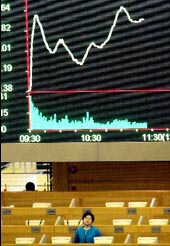 The Dow Jones Industrial average closed down 3.29 percent, or 415.46 points Tuesday, the biggest one-day point drop since just after Sept. 11, 2001. The Nasdaq fell 3.86 percent.
The Dow Jones Industrial average closed down 3.29 percent, or 415.46 points Tuesday, the biggest one-day point drop since just after Sept. 11, 2001. The Nasdaq fell 3.86 percent.
European markets also experienced the biggest single session declines since May 2006.
The culprit for this selloff? Fears that the Chinese Central Bank would act to slow a potentially overheated Chinese economy. The Shanghai stock market was the first to tumble on these fears:
The fact that the Chinese tumble only erased gains made in the previous six days of trading is an indicator of just how fast the Chinese markets have been climbing lately. Here’s the Wall Street Journal again:
Traders in Hong Kong are particularly attuned to mainland China because some of its largest stocks also are listed in Shanghai, including big banks and insurers. Hong Kong’s blue-chip Hang Seng Index lost 1.8% yesterday to 20147.87.
Concerns about possible official action to cool stocks already had slowed the China market this year. After yesterday, the Shanghai index is holding a 3.6% gain in 2007, but the most notable trading sessions have involved drops in prices after officials issued warnings, tightened credit and put limits on the size of mutual funds.
Traders are now looking at whether the National People’s Congress next week will be bad for stocks. In past years, the market has often risen ahead of the meeting, where major laws are adopted and top leaders make speeches, amid hopes the government would unveil supportive policies. Most years nothing happened, though in 2005 Premier Wen Jiabao indicated anxiety about investor losses, and weeks later regulators unveiled a restructuring of stock-ownership rules that many say sparked the current rally.
For a more in-depth look at China’s market, see this Feb. 2 column by Bloomberg’s William Pesek, who is one of the few columnists who follows such things closely. The column seems pretty prescient in light of the last two day’s events:
Speaking in Dubai, Cheng said only 30 percent of companies listed on the Shanghai Stock Exchange “are good to invest in by Western standards,” and investors in the remaining 70 percent will probably lose money. His words sent the Shanghai and Shenzhen 300 Index, which tracks yuan-denominated A shares listed on China’s two exchanges, down 6.5 percent, the biggest one-day drop since the measure was introduced in April 2005
. . .
The Shanghai and Shenzhen 300 Index has more than doubled in the past 12 months as government efforts to make more than $200 billion of state-owned stock tradable revived investor demand. Economic growth that has averaged 10 percent for the last five years also helped boost companies’ earnings.
China doesn’t need more money rushing into its markets. It needs more mature markets, better transparency and more efficient mechanisms. That explains why China’s potential with institutional investors is yet to be fulfilled while the nation of 1.3 billion pulls in most of the world’s foreign direct investment.
